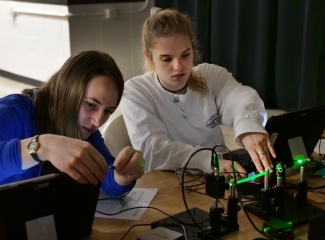Open-ended lab activities are beneficial for students' learning and their beliefs and attitudes about experimental physics. In particular, student-designed multiweek projects are an increasingly common feature in advanced lab courses, where students can design their own questions, experimental procedures, and analysis methods as they engage in authentic experimental practices. In our studies, we investigate students' engagement with modeling and their views about the process of experimental physics from students participating in student-designed multiweek projects in advanced lab courses at three different institutions around the US.
In one study, we found that the students viewed the Experimental Modeling Framework (EMF) as an accurate reflection of the process of experimental physics and recognized that the traditional, linear depiction of the "scientific method" can be misleading. This work suggests that open-ended projects can provide opportunities for students to experience the iterative nature of experimental physics, and that, depending on specific course goals, it may be beneficial to engage in explicit reflections and discussions with students about the role that iteration plays in the process of experimental physics.
In another study, we investigated which parts of the EMF the students engaged with during their multiweek self-designed projects and how that depended on various features of the students' projects. This work may have implications for how instructors structure student-designed projects in their courses.



 The Physics Frontiers Centers (PFC) program supports university-based centers and institutes where the collective efforts of a larger group of individuals can enable transformational advances in the most promising research areas. The program is designed to foster major breakthroughs at the intellectual frontiers of physics by providing needed resources such as combinations of talents, skills, disciplines, and/or specialized infrastructure, not usually available to individual investigators or small groups, in an environment in which the collective efforts of the larger group can be shown to be seminal to promoting significant progress in the science and the education of students. PFCs also include creative, substantive activities aimed at enhancing education, broadening participation of traditionally underrepresented groups, and outreach to the scientific community and general public.
The Physics Frontiers Centers (PFC) program supports university-based centers and institutes where the collective efforts of a larger group of individuals can enable transformational advances in the most promising research areas. The program is designed to foster major breakthroughs at the intellectual frontiers of physics by providing needed resources such as combinations of talents, skills, disciplines, and/or specialized infrastructure, not usually available to individual investigators or small groups, in an environment in which the collective efforts of the larger group can be shown to be seminal to promoting significant progress in the science and the education of students. PFCs also include creative, substantive activities aimed at enhancing education, broadening participation of traditionally underrepresented groups, and outreach to the scientific community and general public.